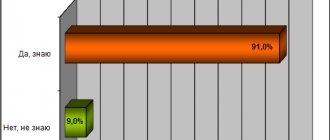General provisions
Payment for some services is carried out on the basis of readings from house and apartment meters. If there are several metering devices, the homeowner does this:
- Captures and records device data. At the same time, the number of registered citizens may affect the size of the quota, which reduces the payment amount, if any.
- Tries not to exceed the standard so that the accrued payment is optimal.
The question of whether rent affects the number of registered people is quite subjective, since it can only be decided by the owner.
Payment for housing and communal services is related to how many people are registered and live in the living space. The more residents you register, the higher the amount. Please also take into account that penalties are charged for late payment, and their amount also increases.
How to pay for an apartment if it has several owners at once - “People's Economy” is about this
Every man for himself. How to divide utility bills between different owners of the same apartment - “People's Economy” is about this.
The percentage should be lowered. Some of the banks that today offer the most generous annual deposits will have to disappoint their customers in October. Reduce rates so as not to fall under the special control of the Central Bank, and they will change the system for calculating permissible interest rates. As before, the maximum rates of the ten largest banks will be taken as a basis (the rest can add at most 1.5%). But now only mass deposits will be taken into account, which are much less profitable than special ones - those for wealthy clients. So, if the innovation came into force today, the recommended maximum rate would decrease by more than a percentage. 10.85, instead of the current 12.03.
And this is necessary to reduce the risks of the banking system. The fact is that increased interest rates on deposits are usually offered where a lot of loans are issued. But experts are not happy with the consumer boom. The slightest financial difficulties and the borrower turns into a debtor. Although interest in borrowed funds may be cooled by rising rates. From June to September, consumer loans rose in price in 12 of the 30 largest banks. And further, according to forecasts, non-targeted offers will continue to grow. An additional 1.5-2% per annum here, according to bankers, is less sensitive than, for example, on a mortgage. After all, such loans are often taken out for several months - for some specific purchases.
The start has been set, and the dates will no longer change. Universal electronic cards should appear in the regions in January. Despite the fact that in most regions nothing has been done for this yet. The federal company leading the project declares its readiness to help local authorities so that every Russian can, by writing an application, replace a medical policy, a travel card, and a pension certificate with one plastic document, and even pay with the same card like an ordinary bank card. By 2020, it is planned to issue about 90 million universal cards, but over time they will be issued not only to those who wish, but to literally everyone.
One for all or each for himself. The notorious housing problem multiplies situations where people who have sometimes become strangers live under the same roof. Divorces, quarrels between fathers and children. And even a utility bill, which is issued, as a rule, for one person—the owner of the personal account—can complicate the situation. But there would be a desire. This bill, it turns out, is easy to split.
Shared housing, but separate money. Igor and Arina are divorced, but for now they live in an apartment that belongs to both. And so as not to once again sort things out - who burned how much light or gas, poured out hot and cold water - they decided that everyone would pay for utilities according to their own account.
“Two receipts. That is, everyone has everything their own. This is how we live,” says Arina Karpova.
The procedure for dividing payments may be delayed if one of the owners is against it. Then only through the court. With mutual agreement, this is literally a matter of minutes.
“This is done by applying to the management organization with an application from all owners or tenants, if they live under a social tenancy agreement, by applying for the division of a financial personal account,” said lawyer Nurida Ibragimova.
The application must be accompanied by an extract from the house register, income certificates, a document on the reasons for splitting the account (for example, a divorce certificate) and most importantly, copies of property certificates. In this case there are two of them.
Igor owns three-fifths of the apartment, Arina - the remaining two-fifths. And it doesn’t matter to those who issue bills whether a person actually occupies one room, two, or huddles in the kitchen on a sofa. But it is important that the apartment has isolated rooms corresponding to the allocated shares. And the kitchen must be at least 6 square meters.
“No one specifically allocates a percentage of payment from the directly occupied space of the entire apartment. The share has already been determined by the documents, so we calculate based on them,” says Sergei Manerov, head of the Center for Coordination of Activities of State Institutions of Engineering Services.
After splitting the personal account, not one, but several receipts will be placed in the mailbox. And everyone pays for themselves. And if he suddenly doesn’t pay, the other residents of the apartment immediately have a problem. You either need to pay off someone else’s debt, and then, in fact, even through the courts, try to get your own back. Or wait for the utility companies to take care of the debts. But it’s good if they delve into the situation, but there is a risk that they will simply turn off the water or turn off the gas. Then again you will have to defend your rights in court.
“We have a controversial issue regarding legislation. They may turn it off if, say, the light has not been used for more than 6 months, they may not turn it off. But our legislation is on the side of the consumer, and in most cases, disconnections are considered illegal,” said lawyer Nurida Ibragimova.
If one of the owners is away, and bills continue to arrive in his name, this is also a concern for those who live in the apartment permanently.
“If you are registered but do not reside, then it is enough to provide documents confirming the fact of non-residence, and we will recalculate accordingly,” says Sergei Manerov, head of the Center for Coordination of Activities of State Institutions of Engineering Services.
In the case of non-privatized apartments, the situation is slightly different. To split the personal account, you need to change the rental agreement. Initially, it was compiled for one family member, but everyone who pays separately will need their own. However, with the consent of all adult residents, problems usually will not arise. And the procedure itself is the same as for owners.
Behave yourself or pay for the trouble you cause others. Madrid stadiums are introducing severe fines for violators of public order. For unsportsmanlike behavior, fans will be issued a ticket for at least 750 euros. Well, for those who will provoke riots in the stands, and for all one and a half thousand. If you don’t pay, you’ll end up on a blacklist, blocking some for a year, and some for 5 years, from attending any sporting events.
How does the calculation work?
The standards established by law may vary depending on the specific region. According to these data, it is calculated how much utility resources each user spends monthly. If metering devices are not installed in the house, then the rent is affected by the number of registered people, even if no one lives in the apartment . The same calculation procedure is established for temporarily registered persons.
When the home is not equipped with any appliances, the rent will be affected by the number of registered people and the tariff amounts are calculated:
- drainage;
- gas supply;
- provision of cold and warm water;
- electricity supply
This is interesting: How to apply for an old-age pension without registration in Russia
Calculation of payments for housing and communal services is carried out on the basis of standards approved at the place of residence in a certain region. However, waste collection fees are also increasing. To make the calculation, the number of persons registered in the living space must be multiplied by the consumption standard.
Who is required to pay rent?
When the owner of a residential space rents it out for a long time, a large number of questions arise about payment for housing and communal services. In such situations, if an unscrupulous landlord comes across, the person renting the house may fall into tricks and pay for the entire utility bill. To ensure that neither the owner of the residential premises nor the citizen living in the apartment splits the payment for utilities on their own, it is enough to divide the responsibilities, according to the law, into two categories:
- The owner begins to make payments for services from the moment the contract for the purchase of residential space is signed. He must pay for the maintenance of housing, its repairs and, in the cold season, heating. The cost of utilities for owners is usually fixed. It changes depending on the season - in winter you need to pay for heating, in summer - not. Thus, the owner of the apartment pays only for its maintenance.
- A person renting a house must pay for the resources that he directly spends. The list of these resources includes: payment for the use of water, gas, electricity. In this case, it all depends on how many resources the tenant himself will spend. The more you spend, the more you pay out.
Knowing this simple division of responsibilities for paying for utilities, you can avoid overpaying for unnecessary things. In the rental agreement for premises, both columns must be indicated with a division of responsibilities for paying for housing and communal services. And if one of the parties obliges the other to pay for something that is not its responsibility, this party has every right to sue. If everything is spelled out in the contract, it will be easier to resolve the conflict, so you need to take care of this when signing the contract.
What utility bills are affected by the number of registered persons?
The fee is based on the volume of each service consumed by residents. The following indicators should be taken into account:
- housing area;
- current tariffs;
- number of registered citizens;
- availability and serviceability of metering devices.
But does the rent always depend on the number of registered people? For example, the payment for electricity is not affected by how many people are registered, since the amount is calculated in accordance with the volume of service that the consumer received. The amount does not depend on who is obliged to pay for the “utilities” - the owner of the property or its tenant. Heating payments are calculated according to the size of the living space. The larger the footage, the higher the payment.
The amount of charges for cleaning the local area, for the maintenance of elevators, garbage chutes, staircases, attics, basements and utility rooms is divided between apartment owners according to the occupied footage.
Registration has nothing to do with the size of this amount; only the total area of the premises is taken into account. The owner of privatized housing does not pay more than the standard, but regularly.
The time for persuasion is over, or how to force people to pay rent
Of all the innovations of the 90s, the housing and communal services reform turned out to be the most long-lasting.
For more than 10 years, the authors of the idea have been trying to introduce its main principle into the consciousness of citizens: you have to pay for everything. And in full: the time for socialist charity is long over. And since last year, the state has stopped subsidizing the housing and communal services sector, even in miniscule amounts, and now housing and communal services enterprises have to rely only on themselves and on the consciousness of their tenants. But it seems that not everyone and everything is in order with their consciousness: the market principle is taking root poorly and non-payment of rent has become a real scourge for public utilities.
How to determine the share of each registered person
In order to optimize costs, each resident’s share is allocated, since calculating the volume of service consumed can be difficult. At the same time, it is important for the owner to determine how much he must pay for housing and communal services for each tenant. It should be noted that the share is calculated approximately, because it is difficult to determine how much service a particular tenant used.
This is interesting: How to change a driver’s license in another city other than your place of registration
Calculation scheme
Take the total amount calculated for each appliance or the entire rent amount and divide by the total number of residents. This quotient is equal to the share of one tenant.
The share will still be approximate, since it is difficult to calculate how a “utility” is defined. It is possible to determine the share with accuracy if there are no metering devices and payments are calculated according to standards.
Eviction of one of the owners
When one of the shareholders does not pay utility bills, questions arise about his eviction from the living space. Co-owners often cannot resolve this issue on their own, so they have to involve a management company.
Penalties (a type of penalty) begin to accrue after 30 days of non-payment of rent debts. And they are equal to 1/300. If the owner does not pay for three months, the fine will already be equal to 1/130 of the refinancing rate.
If a child under 18 years of age is not registered in the apartment, the management organization has the right to limit or turn off the supply of utilities (switching off hot water, electricity).
If a citizen pays off the debt, the supply of utilities will resume, and penalties will no longer be accrued. Otherwise, the matter will be resolved through court.
According to Act 3 of the Housing Code of the Russian Federation, no one can evict a tenant from his property, or restrict access to utilities, except for representatives of the management company. But the Criminal Code does not have the right to evict a person from an apartment, even if he is a debtor. Only the court has the right to do this.
If the owner does not live in the apartment for more than 6 months, he can be discharged. The reason for eviction is also rent arrears.
Important! If the case reaches the court, which gives a positive answer, the owner must vacate the living space within 2 months. If he does not meet the allotted time, his eviction will be controlled by government officials. Article 31 of the RF Housing Code specifies the procedure for eviction of a debtor.
For other owners, you need to know that no one can force you to pay other people’s bills for using utilities.
Which tenants are required to make payments?
An important point that requires clarification: how does registration or lack thereof affect the rent ?
No one is registered
If no one is officially registered in the living space or if a person is not registered, but lives, then the rent is calculated as if one person lives. This calculation procedure is applied monthly until the number of registered persons increases or until the owner obtains a certificate stating that the person does not live at the place of registration.
Nobody lives
Temporary registration allows you to live when you do not have your own place of residence. The type of registration does not affect the payment for the supply of the following services: electricity, gas, water supply and sewerage.
But there are cases when temporary registration is issued without actual residence. If it is necessary to register, for example, near work, an act of non-residence at the place of registration is also drawn up (sample below).
As a rule, even before changing the address of a potential tenant, it is necessary to agree on who will pay for housing and communal services. Through agreement, the rent can be reduced or reduced. You can agree on payment for those services related to registration - garbage removal and heating. It is not difficult to calculate these amounts, because they are detailed in incoming payments.
Recalculation in case of non-residence of the shareholder in the apartment
If a person who is a co-owner of a residential premises does not live in the apartment, he has the right to request a recalculation from the Criminal Code. This is necessary so that he does not have to pay utilities for other residents in the house. When applying for recalculation, you must provide registration information and a photocopy of the rent payment receipt at your place of actual residence. If information about the owner's registration in another place is not provided, recalculation will be denied. Since it will be considered that he lives in the place to which he wants to recalculate.
Thus, after recalculation, this citizen will no longer have to pay for water, electricity, heating and gas.
If a co-owner who does not live in the residential premises believes that he should not pay rent at all, he is wrong. He must also bear expenses, but in a reduced amount.
Enforcement measures against a defaulter for refusal to pay bills
The owner is directly responsible for late payment for housing and communal services , since suppliers deal with the management company or directly with the owners. The person who owns the housing is responsible for non-payment of utility bills (Article 153 of the Housing Code of the Russian Federation). Therefore, every owner must ensure that payment is received on time.
This is interesting: Registration in municipal housing for a spouse, husband, children
In a situation of delay, the issue of how to force the registered person to pay utility bills should be resolved.
List of measures to force you to pay your share:
- separation of personal accounts;
- warning about deprivation of registration;
- filing a claim with a judicial authority.
What to do if the registered person does not pay the rent ? In case of delay, the owner of the property has the right to unilaterally terminate the contract. By going to court, you can recover your utility debt. You will first need to pay it off yourself by signing. This serves as proof that the owner himself paid for the utilities. The formation of a payment slip includes the name of the owner, but in the case of division of accounts, several persons will be listed.
Utility debts are collected in the following ways:
- refusal to provide services;
- lawsuit;
- eviction of unwanted tenants.
Tax on a second apartment for pensioners
Benefits are here to stay, so people who receive them shouldn't worry about ongoing tax changes. Pensioners do not need to pay apartment tax, just like other groups of beneficiaries. This includes: pensioners, disabled people, citizens with disabilities, and so on (the full list can be found in the official law).
But all this applies only to those people who own one unit of personal residential property (house or apartment). If a pensioner owns several apartments at once, then benefits will be provided for only one of them, and therefore taxes will have to be paid annually on the second apartment.
Arbitrage practice
According to the law, the shared owner who does not live in the apartment must pay for the maintenance of the house, repairs and heating. Other services will be calculated depending on certain cases.
The participant is not obliged to pay for gas, electricity and water if he does not live, but a controversial situation may arise.
It happens that owners decide through the court the issue of collecting the required amount from the debtor. But it often happens that the management company independently goes to court. In this case, claims will be made against all owners.
If you have proof that you paid, then there should be no problem. In the absence of separate payment, it will be very difficult to defend this fact.
If you contacted the management company with a request to send a separate receipt to each owner, but received a refusal, you can file a claim in court:
- the court will recognize such a decision as unlawful and will oblige the management company to enter into agreements with each participant separately, according to which the payment will be calculated in accordance with shares;
- It happens that representatives of the management company do not agree with such a decision and file a lawsuit to appeal it. The court will refuse to satisfy the demands.









